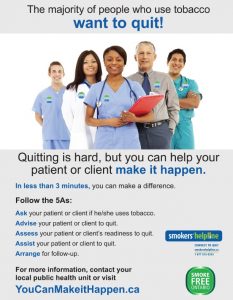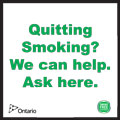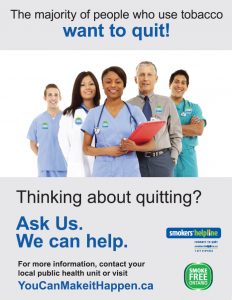IN ALL HEALTH SETTINGS
Impact of interventions on tobacco use morbidity and mortality
There is strong evidence that Health Care Providers can make a difference in helping their clients quit. Unassisted quit attempts are successful only 3-5% of the time, compared with up to 20% success for those receiving cessation counseling and medications. Cessation interventions are now considered to be requisite duties of many health care professionals.
- Tobacco use kills an estimated 37,000 Canadians every year
- Many of these deaths are premature and could be prevented
- People who smoke have a much higher chance of getting a serious disease like cancer, heart or lung disease or suffering a stroke
- Smoking also adds a huge burden to our health care system
- The health and economic costs associated with tobacco use are estimated to total $17 billion annually, including $4.4 billion in direct health care costs
Evidence to support tobacco dependence interventions
- Evidence to Guide Action: Comprehensive Tobacco Control in Ontario. Smoke-Free Ontario – Scientific Advisory Committee
- Tobacco Use in Canada: Patterns and Trends: Report (Propel Centre for Population Health Impact)
- Tobacco, Illness, and the Physician’s Perspective: Ontario Medical Association Position Paper
- Physician advice for smoking cessation: Cochrane Database of Systematic Reviews
- Tobacco: The Role of Health Professionals in Smoking Cessation: Joint Statement
- CAN-ADAPTT: Canadian Practice-Informed Smoking Cessation Guideline
- Integrating Smoking Cessation into Daily Nursing Practice: Registered Nurses Association of Ontario Nursing Best Practice Guideline
- Treating Tobacco Use and Dependence: 2008 Update (US Department Health & Human Services): Clinical Practice Guidelines
Examples of evidence-based practice systems
- Worksheet for implementing a policy in your setting
- It only takes a few minutes to make it happen.
- The 5A’s model of minimal contact tobacco intervention is:
- Recognized internationally as a best practice in tobacco cessation.
- Advocated for in many clinical best practice guidelines.
- Supported as effective through a number of studies and meta-analysis.
The You Can Make It Happen toolkit, Integrating tobacco cessation interventions (5A’s) into your daily practice will outline how to use the 5A’s to ensure that for every patient, at every visit, tobacco use status is queried and documented.
Examples of patient assessment and pharmacotherapy tools
- Free stop smoking medications are available in Ontario
- Assessment forms and screening tools
Resources for Patients and Staff
Available for download. Contact your local Public Health Unit or Smokers’ Helpline for requests to adapt resources.
LGBTQ Resource Links
- Planned Parenthood’s Send the Right Message
Send The Right Message is a LGBTQ Youth Initiative campaign with the goal to encourage straight and cisgender youth to challenge every day instances of homophobia, biphobia and transphobia. - Rainbow Health Ontario
Rainbow Health Ontario works to improve the health and well-being of LGBTQ people in Ontario, and to increase access to competent and LGBTQ friendly health care services across the province. This is done by providing education and training to providers, advocating for public policy change, sharing information and consulting with service providers and organizations. - Clear the Air – LGBTQ tobacco use
The Clear the Air project came about because smoking rates in the LGBT communities are much higher than those among the general population. The purpose of this project is to raise awareness about smoking in the LGBTQ communities and to ultimately make the community healthier by decreasing smoking rates. - The 519
The 519 is committed to the health, happiness and full participation of the LGBTQ community by making a real difference in people’s lives, while working to promote inclusion, understanding and respect. The 519 offers resources, education and training and other forms of community support. - Creating Authentic Spaces Toolkit
A gender identity and gender expression toolkit to support the implementation of institutional and social change. - University of Toronto’s LGBTQ Health Research
This research team is made up of lesbian, gay, bisexual, transgender, transsexual, Two-Spirit, and queer (LGBTQ) and ally researchers who focus on understanding how LGBTQ people experience physical and emotional (mental) health, and how they access health services. - LGBT Youthline
The Youth Line is a toll-free peer-based phone support line created to assist lesbian, gay, bisexual, queer and questioning young people across Ontario. - CDC LGBT Health
The CDC provides information and resources on some the health issues and inequities affecting LGBT communities. Links to other information sources and resources are also provided.
Training opportunities for staff
In-person:
- RNAO Smoking Cessation Champion Workshops
The Registered Nurses` Association of Ontario invites all nurses, nursing students and other health care professionals to attend a FREE one day workshop on Smoking Cessation Best Practices! - University of Massachusetts Medical School
Centre for Tobacco Treatment Research and Training Tobacco Treatment Specialist Core Training is an intensive 4-day program, conducted in person and offers certification as a Tobacco Treatment Specialist
Web-based:
Canada:
- Training Enhancement in Applied Cessation Counselling and Health (TEACH)
Training Enhancement in Applied Cessation Counselling and Health (TEACH) Project provides training for health care professionals in the public, private and non-profit sectors who provide intensive counselling services to people who use tobacco. Practitioners who are TEACH trained in Ontario can become certified by the University of Toronto in the delivery of intensive tobacco cessation interventions. TEACH is accredited by the College of Family Physicians of Canada Main-Pro C, Canadian Addiction Counselling Certification Federation and the Ontario College of Pharmacists. - Registered Nurses’ Association of Ontario (RNAO)
FREE interactive web-based courses aim to help health-care professionals learn simple and effective techniques to talk to their patients about smoking cessation. - Ontario Tobacco Research Unit (OTRU)
OTRU’s online course, Tobacco and Public Health: From Theory to Practice features accessible, comprehensive and evidence-based Canadian content that is geared to individuals working in tobacco. - Canadian Action Network for the Advancement, Dissemination and Adoption of Practice-informed Tobacco Treatment (CAN-ADAPTT)
In addition to the on-line Dynamic Guidelines for Tobacco Control in Canada, CAN-ADAPTT hosts a Guidelines Discussion Board, inviting health care providers to make comments on how these recommended practices may or may not work in their setting and provide suggestions and/or evidence of what practices have worked for you or may work when treating tobacco dependence. - Introduction to Motivational Interviewing online course – Centre for Addiction and Mental Health
Based on the book Motivational Interviewing: Helping People Change (Third edition, 2013), this simulation-based and interactive online course is designed for health care practitioners who have direct client care responsibilities. This course offers 44 hours of training on how to use core motivational interviewing skills in conversations about change across a range of health-related issues. - Certificate in Motivational Interviewing: Spirit to Skills An Introduction to Motivational Interviewing for Professional Practice – University of Toronto
This course will focus on teaching the principles and spirit of MI to help practitioners develop skills to guide their clients through the change process. - Training in Motivational Interviewing For Health Coaches: Help Your Clients Get Unstuck – York University Health Leadership and Learning Network
This workshop is an intensive introduction to Motivational Interviewing with movement to an advanced level of competency in understanding how to implement and sustain Health Behaviour Change for your clients, your programs, and overall practice. - Tobacco Free RNAO
The Registered Nurses’ Association of Ontario invites nurses and other health-care professionals to attend FREE knowledge exchange webinars to learn more about smoking cessation interventions within specific populations groups and other smoking cessation topics. - Centre for Addiction and Mental Health Lunch and Learn Series:
This monthly seminar series is designed for physicians, Family Health Teams (FHTs) and other health/allied health practitioners to enhance their knowledge and skills in offering cessation interventions.
United States:
- New York State Department of Health Tobacco Control Program
Physicians, Physician Assistants, and Nurse Practitioners can earn Continuing Medical Education (CME) credit through their New York State Tobacco Cessation Centers. - The University of Wisconsin Center for Tobacco Research and Intervention (UW-CTRI)
Healthcare Providers Tools for Treating Tobacco Dependence including online CME course. - National Tobacco Cessation Collaborative Healthcare Provider Microsite
Provides ongoing Tobacco Treatment Specialist (TTS) Certification as well as free online courses. - University of Massachusetts Medical School Centre for Tobacco Research and Training
- Association for the Treatment of Tobacco Use and Dependence (ATTUD)
ATTUD is an organization of providers dedicated to the promotion of and increased access to evidence-based tobacco treatment for the tobacco user. - Brown University: The Center for Alcohol and Addiction Studies Distance Learning Program
Online continuing education courses covering a range of topics relating to advances in addiction treatment and prevention. Courses relevant to tobacco use cessation include: Addressing Tobacco Use and Dependence in Addiction and Behavioral Health Services; Motivational Interviewing: Fundamentals; and Motivational Interviewing: Encouraging client change and rolling with resistance.
Monitoring and evaluation
- Tobacco Informatics Monitoring System (TIMS).
Innovative web-based application designed to provide easy access to reliable, up-to-date data on key tobacco control indicators.
- Data Standards for Smoke-free Ontario Smoking Cessation Service Providers
Common measures and definitions are provided to ensure equivalent reporting by service providers. Key data standards and definitions are provided in this document for adult (18 years of age and older) tobacco users participating in smoking cessation programs. These data standards/questions and definitions can be utilized when creating your patient assessment forms.








